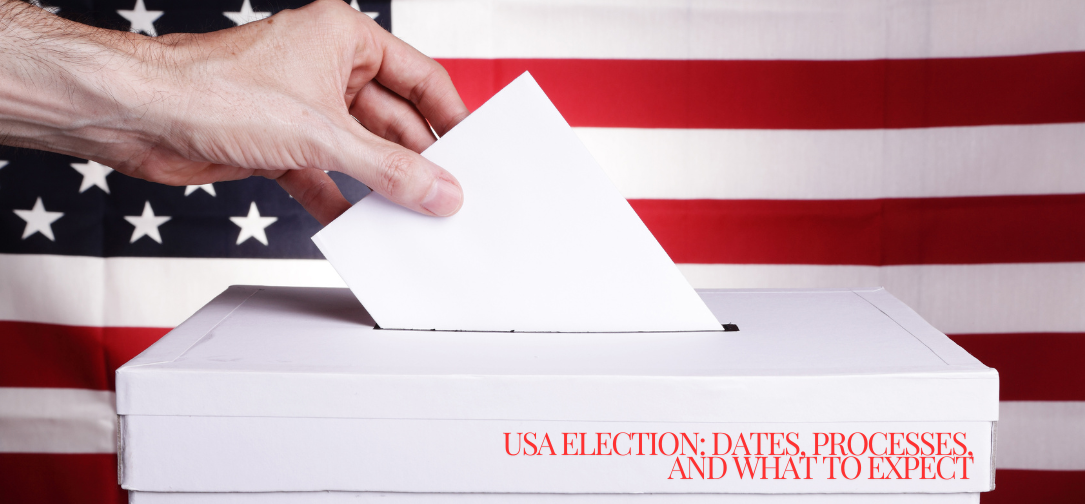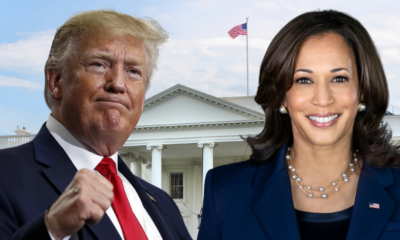Politics
Upcoming USA Election: Dates, Processes, and What to Expect

The United States of America (USA) stands as one of the world’s oldest democracies, renowned for its intricate and elaborate electoral system. The upcoming USA election, scheduled for November 5, 2024, is not just another routine event; it marks a significant point in American history as the nation prepares to elect its next President, along with numerous Congressional representatives, state officials, and local government leaders. This article aims to provide a comprehensive analysis of the 2024 election, detailing the processes involved, key dates, and what voters and observers can expect.
The Date: November 5, 2024
The upcoming general election is set to take place on Tuesday, November 5, 2024. In the United States, federal elections are held on the first Tuesday after the first Monday in November every even-numbered year. This date is constitutionally set and has historical roots dating back to the 19th century, designed to accommodate the agrarian economy of the time by ensuring that farmers had enough time to travel to polling places after the harvest and before the harsh winter conditions.
The Election Processes
The U.S. election process is multi-layered and complex, involving several key stages that include primaries and caucuses, national conventions, the general election campaign, and finally, the election itself. These processes are guided by both federal and state laws, with each state having considerable autonomy in how it conducts its elections.
1. Primaries and Caucuses
Primaries and caucuses are the first major phase of the election process, typically starting in early February and continuing through June. These processes are used by political parties to select their nominees for the presidential election. While both aim to achieve the same outcome, they differ in method.
- Primaries: These are state-level elections where voters cast ballots for their preferred candidate. Primaries can be open, closed, or semi-closed. In an open primary, voters do not need to be affiliated with a party to vote for a party’s candidate, while in a closed primary, only registered party members can vote. Semi-closed primaries allow unaffiliated voters to choose which party’s primary to vote in but do not permit crossover voting.
- Caucuses: These are local gatherings of party members where they discuss and vote on candidates. Caucuses are more time-consuming than primaries and often involve multiple rounds of voting, with discussions and negotiations playing a crucial role in the final decision.
The results of these primaries and caucuses determine the number of delegates each candidate will have at the national conventions, where the party’s official nominee is selected.
2. National Conventions
The national conventions are typically held in the summer of the election year, after the conclusion of the primaries and caucuses. Each major political party—the Democrats and the Republicans—holds a convention where delegates officially cast their votes for the presidential candidate. The candidate with the majority of delegate votes becomes the party’s nominee.
The conventions also serve as a platform for the parties to unify their members, rally their base, and formally launch their general election campaigns. During the conventions, the parties also adopt their platforms, which are documents outlining their policy positions and goals.
3. The General Election Campaign
Once the nominees are chosen, the general election campaign begins in earnest. This phase is characterized by intense campaigning, with candidates traveling across the country to garner support. The campaign includes:
- Debates: Presidential debates are a significant part of the general election campaign. They provide an opportunity for candidates to present their views on key issues, engage with their opponents, and connect with the electorate. The debates are typically organized by the Commission on Presidential Debates (CPD) and are broadcasted nationally.
- Advertising: Campaigns spend substantial amounts of money on advertising to reach voters. This includes television ads, digital campaigns, social media outreach, and direct mail. The messaging often focuses on key issues, the candidates’ records, and their visions for the country.
- Rallies and Town Halls: Candidates hold rallies and town halls to engage with voters directly. These events are critical for mobilizing the base and persuading undecided voters.
- Fundraising: Fundraising is a crucial aspect of the general election campaign. Candidates raise money from individual donors, Political Action Committees (PACs), and other sources to finance their campaigns.
- Voter Outreach: Campaigns employ various strategies to reach voters, including phone banking, canvassing, and targeted digital outreach. Voter turnout efforts are particularly focused on swing states—states that could reasonably be won by either the Democratic or Republican candidate.
4. Election Day: November 5, 2024
On Election Day, voters across the country will cast their ballots for the President and Vice President, as well as for members of Congress, state officials, and local government leaders. The U.S. operates a decentralized voting system, meaning that the administration of elections is largely the responsibility of individual states and counties. This includes managing voter registration, the setup of polling places, and the counting of ballots.
5. The Electoral College
The United States uses an Electoral College system to elect the President. The Electoral College consists of 538 electors, and a majority of 270 electoral votes is required to win the presidency. Each state has a certain number of electors based on its total number of Congressional representatives (Senators and House members).
When voters cast their ballots for president, they are technically voting for a slate of electors pledged to that candidate. The electors then cast their votes in December, which are counted in a joint session of Congress in early January. While most states award all their electoral votes to the candidate who wins the popular vote in that state, two states—Maine and Nebraska—use a proportional system.
6. Inauguration Day
Inauguration Day marks the official beginning of the new president’s term and is scheduled for January 20, 2025. The president-elect takes the Oath of Office and delivers the inaugural address, setting the tone for the new administration. This event is steeped in tradition and symbolizes the peaceful transfer of power, a cornerstone of American democracy.
Key Issues and Voter Concerns in the 2024 Election
The 2024 election is expected to be a highly contentious and closely watched event, with several key issues likely to dominate the campaign discourse:
1. Economic Stability
The state of the economy will undoubtedly be a central issue. Voters will be concerned about inflation, job creation, wage growth, and the overall economic recovery following the disruptions caused by the COVID-19 pandemic. Candidates will likely offer contrasting visions for how to manage the economy, with debates over taxation, government spending, and trade policies taking center stage.
2. Healthcare
Healthcare continues to be a major concern for many Americans. The future of the Affordable Care Act (ACA), the rising cost of prescription drugs, and the broader issue of healthcare access will be pivotal topics. Candidates’ stances on these issues could significantly influence voter preferences.
3. Climate Change and Environmental Policy
With growing awareness and concern over climate change, environmental policy is expected to be a crucial issue in the 2024 election. Discussions will likely focus on renewable energy, environmental regulations, and the U.S. role in global climate initiatives.
4. Social Justice and Civil Rights
Social justice issues, including racial inequality, police reform, and voting rights, will likely remain at the forefront of the 2024 campaign. The candidates’ positions on these issues could play a critical role in mobilizing voters, particularly among younger demographics and minority groups.
5. Foreign Policy and National Security
Given the complex global landscape, foreign policy and national security will be key issues in the election. Voters will be interested in the candidates’ approaches to dealing with international threats, alliances, and trade agreements. The handling of relations with key global powers such as China and Russia will also be scrutinized.
Voter Participation and Turnout
Voter turnout is a critical factor in determining the outcome of the election. The U.S. has seen fluctuating levels of voter engagement over the years, with recent elections witnessing increased participation. The 2020 election, for instance, saw a historic turnout, driven in part by the contentious nature of the campaign and the widespread use of mail-in voting due to the pandemic.
For 2024, efforts to increase voter turnout will be a major focus for both parties. This includes mobilizing base voters, engaging swing voters, and ensuring that voting is accessible to all eligible citizens. Issues such as voter ID laws, the availability of early voting, and the ease of absentee voting will be central to discussions about voter participation.
Challenges and Controversies
As with any election, the 2024 U.S. election is likely to face several challenges and controversies. Some of the key concerns include:
1. Election Security and Integrity
Election security has been a major issue in recent U.S. elections, with concerns about foreign interference, cyberattacks, and misinformation campaigns. Ensuring the integrity of the election process will be a top priority for election officials and government agencies.
2. Voter Suppression and Disenfranchisement
Accusations of voter suppression and efforts to disenfranchise certain groups have been prominent in recent elections. Issues such as restrictive voter ID laws, purges of voter rolls, and the reduction of polling places in certain areas are likely to be contentious topics.
3. Legal Challenges
In the aftermath of the 2020 election, the U.S. witnessed a wave of legal challenges to the election results. It is possible that the 2024 election could see similar disputes, particularly if the results are close in key battleground states.
4. Misinformation and Disinformation
The spread of misinformation and disinformation poses a significant threat to the electoral process. Social media platforms and traditional media outlets will play a crucial role in combating false narratives and ensuring that voters have access to accurate information.
Conclusion
The 2024 U.S. election is poised to be a pivotal moment in American history, with significant implications for the future direction of the country. The processes involved in this election, from the primaries to the general election and the Electoral College, reflect the complexity and depth of the U.S. democratic system. As candidates prepare to vie for the nation’s highest office, voters will be faced with critical decisions that will shape the country’s political, economic, and social landscape for years to come.
This election will not only test the resilience of American democracy but will also serve as a reflection of the nation’s values, priorities, and the collective will of its people. As November 5, 2024, approaches, the world will be watching closely, keenly aware that the outcome will resonate far beyond the borders of the United States.
-

 Press Release4 days ago
Press Release4 days agoNura Labs Files Revolutionary Patent: AI-Powered Wallet Solves the $180 Billion Crypto Staking Complexity Crisis
-

 Press Release2 days ago
Press Release2 days agoGlobal Compound Feeds and Additives Industry Report: Market Expansion and Competitive Insights to 2035
-

 Technology2 days ago
Technology2 days agoWhat to Know Before Switching Cell Phone Network Services in 2025
-

 Press Release9 hours ago
Press Release9 hours agoCrypto WINNAZ Launches First On-Chain Yield Engine for Meme Coins, Enabling 20x–300x Returns


































